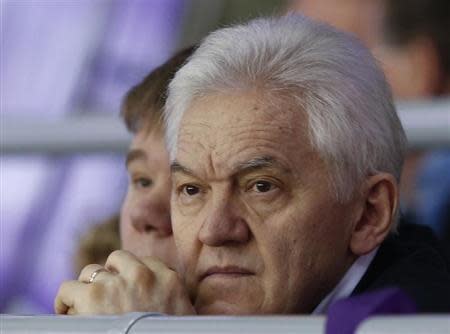Billionaire Russian gas trader says U.S. sanctions a badge of honour

By Christian Lowe
MOSCOW (Reuters) - Gennady Timchenko, the billionaire Russian gas trader hit with U.S. sanctions over his alleged ties with the Kremlin following Russia's annexation of Crimea, said being singled out by Washington was a badge of honour.
But Timchenko, who sold his stake in oil trading firm Gunvor hours after the sanctions were announced, acknowledged that the sanctions were slightly inconveniencing his business interests because some European banks were reluctant to deal with him.
"The fact that I was included in the list (of people subject to U.S. sanctions) was a little surprising maybe, but it was quite an honour for me," he said in an interview with the state-run Rossiya television station to be broadcast later on Saturday.
"Some (problems) arise because some banks, realising who they are dealing with, are starting to create certain difficulties... They are frightened," he said, according to a pre-transmission transcript provided to news organisations.
"In general it is not all that serious because we anticipated this might happen and so in a certain sense took care in advance of our assets" by shifting them into Russian bank accounts, Timchenko said.
His remarks were in line with the defiant mood Russian officials and business figures have projected - at least in public - in response to the U.S. and European Union sanctions.
He was the most high-profile business figure included on the U.S. sanctions list drawn up in response to Russia's seizure of Ukraine's Crimea Peninsula after its pro-Russian president was ousted by a protest movement seeking closer ties with the West.
The U.S. Treasury said that Russian President Vladimir Putin has investments in Gunvor and may have access to Gunvor's funds. Both the company and the Kremlin strenuously denied those allegations.
Gunvor started out selling small shipments of crude through the Estonian port of Tallinn. It grew spectacularly, at one point becoming the biggest exporter of Russian oil through contracts with state majors such as Rosneft
TILTING EASTWARD
Timchenko, who is also co-owner of Russia's No. 2 gas producer Novatek , signalled he would be pursuing more business opportunities in Asia - part of a shift the Kremlin is encouraging away from links with the West.
Russian officials say that if Europe does not treat them with the respect they are due, the country will instead sell its oil and gas to the resource-hungry Chinese market instead, and that European countries will lose out as a result.
The interview, for the Russian news show Vesti on Saturday with Sergei Brilyov, was recorded when Timchenko was on a visit to China.
He said his company was in talks with Chinese partners about selling gas in exchange for yuan, displacing the euros and dollars traditionally used for such transactions.
Novatek has a 60 percent stake in a $27 billion project to produce gas in Russia's Arctic Yamal region, primarily for shipping to Asian customers.
"It is very important to say that Europe is sort of pushing us away from it and this has been going on already for several years," Timchenko said in the interview.
"Therefore it seems to me that this development (shipping more gas to Asia) will show the Europeans that, first of all, we have the capability to do this, and secondly, that there is a market with a lot of potential developing in the Asia-Pacific region."
On the Western response to Russia's intervention in Ukraine, Timchenko said: "In Europe, unfortunately, they have a poor grasp of the situation. When they get involved in some kind of international affair, they don't really understand what it is, and what sort of consequences could follow."
"It seems to me they (the Europeans) just don't understand. The politicians are behaving ... in a very short-sighted way."
(Reporting by Christian Lowe; Editing by Mark Heinrich)


